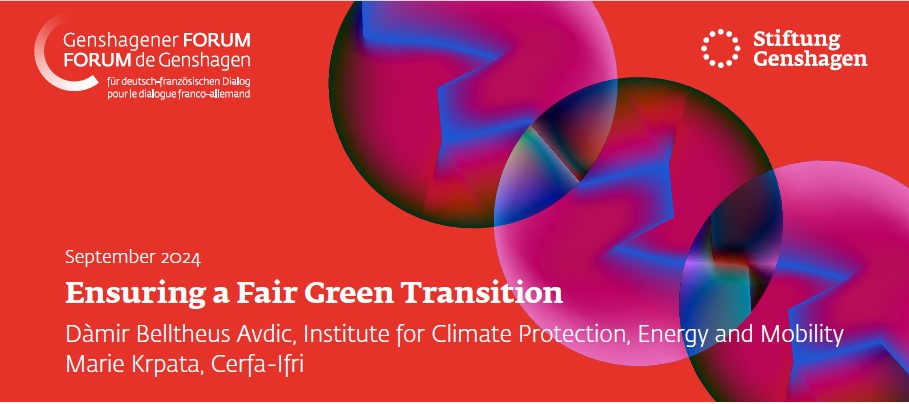Ensuring a Fair Green Transition
“Humanity has opened the gates of hell”, stated UN Secretary-General António Guterres at the Climate Ambition Summit in September 2023, emphasising that we are currently on a path of global warming above 2.4°C or even 2.9°C.

Despite this, climate action has faced headwinds in recent years, perhaps particularly in Europe. In the face of a context hostile to the structural changes necessary for the transition, which disparities should be urgently tackled? How can a fairer green transition be ensured? And, last but not least, what Franco-German perspectives are there on this issue?
This Paper resulted from a workshop at the 12th Genshagen Forum for Franco-German Dialogue (June 27 and 28, 2024) with the topic “Disintegrated Societies? The Future of Cohesion in Europe”.
Dàmir Belltheus Avdic, Head of Climate and Innovation Department, Institute for Climate Protection, Energy and Mobility (IKEM), Berlin.
Marie Krpata, Research Fellow, Study Committee on Franco-German Relations (Cerfa) at Ifri, Paris
- This publication is published on the Genshagen Website.

Available in:
Themes and regions
DOI
12th Genshagen Forum for Franco-German Dialogue, Genshagen Foundation, Berlin
Share
Related centers and programs
Discover our other research centers and programsFind out more
Discover all our analysesBundeswehr: From Zeitenwende (historic turning point) to Epochenbruch (epochal shift)
The Zeitenwende (historic turning point) announced by Olaf Scholz on February 27, 2022, is shifting into high gear. Financially supported by the March 2025 reform of Germany’s “debt break” and backed by a broad political and societal consensus to strengthen and modernize the Bundeswehr, Germany's military capabilities are set to rapidly increase over the coming years. Expected to assume a central role in the defense of the European continent in the context of changing transatlantic relations, Berlin’s military-political position on the continent is being radically transformed.
Merz’ European Policy-making: The End of the ‘German Vote’?
Friedrich Merz’s European ambition is to turn Germany, long seen as hesitant into a leading actor within the European Union (EU). To that end, he has pledged to end the “German vote,” a phenomenon that epitomizes the paradox of a country both indispensable and frequently absent from European decision-making.

Securing critical raw material (CRM) value chains – a prerequisite for Europe’s technological resilience
At the heart of economic security, technological resilience is a backbone of the European Union’s (EU) competitiveness. The EU’s energy and digital transitions depend on critical raw materials (CRM).

Reconciling competitiveness and demographic change: a Franco-German imperative
France and Germany are facing parallel demographic shifts that could reshape the future of their economies and their social models. These shifts reflect broader European patterns but are magnified by the central role both nations play in EU governance and competitiveness.










